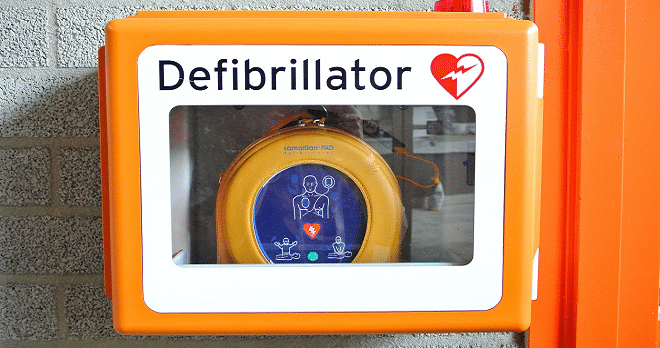Do we really need a defibrillator in the office?

At present there is no legal requirement for employers to provide defibrillators in the workplace. The higher risk group for cardiac arrest or heart attack are those over the age of 45. How many over the age of 45 do you have in your employment?
How would your company be impacted if they died tomorrow at work, apart from the tragedy of such an occasion, how would this affect productivity in loss of a critical team mate or friend, how would your company be perceived by deciding not to invest in a device that costs less than a laptop computer?
Simply because you have never had a cardiac arrest in your workplace does not mean that this will not occur. Using this as a risk assessment is flawed logic.
Survival rates
With every minute of delay in defibrillation from the onset of SCA, the chances of survival diminish by 10%. After 10 minutes the chances of survival are negligible. For the best chance of survival, defibrillation should occur within the first 4 to 6 minutes following the SCA as after this time brain damage becomes likely to occur. The Resuscitation Council Guidelines (2015) relating to the use of AED’s (Automated External Defibrillators) in an out of hospital environment recommends early attempted defibrillation.
Nearest defibrillator
So, given that the average response time of the emergency services in the UK is 10 minutes (with fair winds and following seas), do you know where your nearest AED is and how long would it take to get it, assuming you are allowed to take it away –unlikely!
Did you know that there is no national database of the locations of AED’s around the country. Certain manufacturers keep a record of their own and we all know for example there is probably one in our local railway station but do we know the location of the nearest one to our office? No, as this is simply not part of a national database and in my view needs to be addressed.
Most objections to purchasing an AED are financial yet a defibrillator provides extreme value at a critical moment. Would you take the same view with a sprinkler system or fire extinguisher?
Risk factors
Many factors in the workplace can increase the risk of an SCA or limit the timely delivery of potentially life saving defibrillation therapy:
- An ageing workforce;
- Difficult to access locations such as in the centre of town where there are one way streets making it difficult for emergency responders to reach due to the need to negotiate traffic, staircases, elevators, escalators or crowds;
- Buildings with tight security controls or spread out facilities;
- Relatively remote locations resulting in longer response times by emergency services.
Why should your workplace purchase a defibrillator?
The person who collapses in the workplaces is most likely to be a witnessed cardiac arrest which generally has a higher chance of survival, obviously on the basis that someone provides treatment! Early defibrillation would further increase the survival rate from less than 5% to more than 50%.
A work place first aider, if appropriately trained can help keep a victim alive with basic CPR until the ambulance first responder arrives, however the use of AED’s can minimise time to defibrillation when every minute counts. Such training is often incorporated in life support training courses at minimal cost. Also, many manufacturing companies of AED’s provide training for a limited number of personnel.
An AED could see your life saved in the workplace. Having worked as an ITU sister and being familiar with advanced life support techniques is all well and good however I now work in an office in a high stress environment. In my view, it is only a matter of time before we witness a cardiac arrest and with the best training in the world I know that without early defibrillation my enhanced skills and those skills of my work colleagues trained in basic CPR may not be enough.
As a Clinical Negligence Lawyer I often see cases where there has been a failure to provide adequate and prompt treatment in a hospital setting where there is little or any excuse for poor emergency care delivery. Thankfully, in the UK, providing basic first aid even if unsuccessful should not result in a claim against you. However, it may be that in the future certain businesses/organisations will be open to HSE investigation if they have no trained first aiders and no access to a defibrillator.
efaerfaerfgaerg